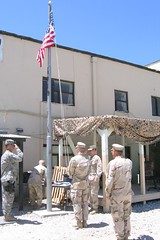I remember conversations about this when I was in Grad school (note: not with other grad students). While some of this may be just usual 20 something angst, at the time the local pastor was also proclaiming that our entire social circle were a group of social freaks. When God declares this view of you, a certain allowance of cynicism towards life and the world could be understandable.
Are there things to be depressed about? The candidate list is fairly long. Among the list of actions that I have engaged in that have been described as evil and/or warranting eternal damnation at one time or another include working in academics, deploying and working in a combat zone, work with the Red Cross, catching a falling hiker, organizing social activities (both with undesirables as well as including people I should not), associating with doctors, lawyers, police, diplomats, responding to calls for help, (list goes on. Note that no one person would hold the entire list against me, just their own selected parts as their moral authority deems fit.)
My wife and I have the fortune of knowing and counting as friends people with a wide range of history, interest and backgrounds. We know both the wealthy as well as those who have chosen to be simple. Those who are world class in their chosen pursuits, and others who may or may not have a college education. Doctors, lawyers, engineers, tradesmen and craftsmen who take pride in the attributes and high callings of their professions. Christian, Buddhist, Jew, agnostic and atheists. And for each of these, those who view those as moral inferiors.
As we have gotten older, we recognize that our group of friends, relations and acquaintances has been narrowing over the years. And we've been told that would be the case. But we have also hoped that we would maintain a range of friends. Because someday, we would be starting a family.
We get asked sometimes if we hope that our son will be just like us. Both of us say absolutely not. Because as much as we enjoy life, neither of us think you can ask someone to take the paths we've taken. While it is entirely possible that he may choose to take life in a similar direction, that may not happen. And we want people we know and trust to be companions along the way.
What do we hope that he learns? We hope that he learns that people are interesting and have stories that are worth getting to know. Deeply.
We hope that he learns that there is value in learning and understanding something deeply. To learn to recognize what good looks like in any field of endeavor, and that it is worth striving to meet that standard.
We hope that he learns to value the creative, the ones who find ways to do the difficult tasks that have never been done. We hope that he decides that difficult things are worth doing. And, if he is good enough, that difficult things are the things that are worth his time, energy and creativity.
Is this guaranteed? No. As much as we hold certain values, we are fully aware that we are around people who scorn those values. And our son will be exposed to them. And along the way he will choose. But we can ensure he knows the choice he makes.
In the end, the goal of life is not the avoidance of things that are bad, but the striving for the things that are good. Our child may not achieve all of his dreams and will experience pain, suffering and hurt along the way. But he can also make choices, that we hope are those that lead to things beautiful and useful. And the stories he will create along the way, and the stories we build with him are something worth looking forward to.
